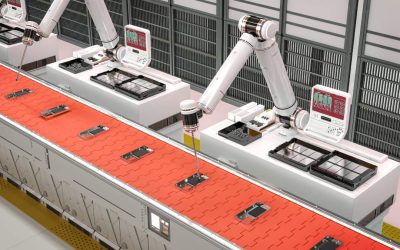We can’t deny, manufacturing today is challenging.
The economy is currently operating below capacity, unemployment is high, and restrictions due to the pandemic are still apparent.
In light of this current economic situation, a fresh wave of support for automation is now upon us.
Allowing businesses the opportunity to take stock, re-evaluate, re-purpose, and re-position systems and processes for the future.
Businesses across all industries are now looking to invest in automation technology to improve processes, meet greater demands, and remain agile even during the most challenging economic situations.
Businesses now want to transform into lean, agile manufacturing outlets that have taken the necessary precautions to future-proof their business, ultimately:
- making better use of resources
- reducing staffing needs for specific tasks, thereby freeing up employee’s time to focus on more complex activities that can create and deliver more value
- increasing productivity
- increasing speed to market
- supporting new product development,
- and much more.
But how do you know if now is the right time to invest in automation?
Reasons to invest
Potential impact on your business
For automation to prove its worth, it needs to have an impact, and it must be a positive impact at that.
For example, by automating those repetitive, routine tasks, have you freed up your employee’s time to work on new product development lines that require creativity and further innovation?
Look where productivity improvements can have the most impact. Even one small change can lead to greater economies of scale and greater economies of scope.
Cost
Automation is a big investment. However, we balance this against future cost savings and additional revenue generated.
In fact, most companies report a return on investment between 6-18 months.
If you have the budget, now might be the perfect time to implement automation into your business operations.
How easy is it to implement?
Of course, this is wholly dependent on the system and process in question. Some require complete overhauls, whereas others can be implemented without too much disruption.
It’s also important to note; not everything has to change at once; scaling automation and working with the right team (like the innovative team at Innomech) can help.
Customer behaviour has changed
Now customers want to be served digitally and expect their goods and services instantly. If customers have a choice, they will always opt for the fast, efficient option every time.
For you, this means that if your systems and processes aren’t flexible in approach, then you could be driving your customers straight into the arms of your competitors.
Equipment is failing
If your equipment is starting to fail, now could be the perfect time to consider implementing automation rather than replacing like for like.
Upgrading your systems and ultimately having the ability to do more with fewer resources allows you to save on costs and increase production.
You have less staff due to illness/COVID
Implementing process automation can help you manage staff shortages, minimising business loss by supplementing your labour capacity.
With automated systems, you’re able to continue to operate at the same capacity while also adhering to social distancing guidelines.
Capacity is maxing out
There is only a set amount you can achieve with the resources you have. Taking on more innovative approaches with automation, you can create a smarter way of building capability and scaling, so capacity very rarely becomes an issue.
This also allows you to control costs while boosting productivity.
You have a new product
Developing automated processes and manufacturing systems to support new product development lines ensures quality, avoids error, and offers you end-to-end traceability, as well as a speedier route to market.
Product quality issues arise
You can eradicate quality control issues with automation as it removes the potential of human error and maintains high-quality standards.
Never
It might feel like there is never a good time to introduce automation because you have a business to run, orders, products, services to deliver, and stopping production from fulfilling these is not an option.
However, this mindset will not help prepare your business for the future. To offer you the flexibility to manage and switch between processes rather than experiencing a complete halt. Automation, especially during the pandemic, was almost seen as doubling down on efficiencies to help businesses ride out the storm.
Introducing automation in small and medium-sized industries continues to prove itself successful, both in terms of productivity and financially. It has excelled in improving operational efficiency, delivering higher quality services, and offering manufacturers a competitive differentiator in the form of business agility.
If you’re looking to improve productivity, profitability, and compliance with bespoke automated equipment, speak to the experts at Innomech today. Available to help you design, develop, and produce manufacturing automation processes that support your investment.
Make now the time to focus on your business operations and invest in your automation.




